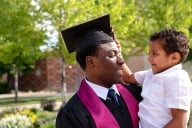You have /5 articles left.
Sign up for a free account or log in.
Many colleges bar all sexual relationships between faculty members and their current students. Some colleges ban relationships between faculty members and all students, or all undergraduates.
Hofstra University is facing criticism -- and is vowing to change its policies -- because a case has become public in which a professor expressed romantic interest in an undergraduate just as she finished his course. Since she was no longer his student, his conduct appears not to be barred by current university policy.
The professor attached a handwritten letter for one of his former students to her final graded project. She remained an undergraduate even though her course with Chandler Carter of the music department was then over.
“At the risk of embarrassing myself, I confess a foolish and dangerous attraction to you,” said the letter to Angelina Scolari.
"I could call it a schoolboy crush, but I’m not a schoolboy. It’s more a midlife crisis, I suspect, which may have little to do with you," the letter said. "Regardless, I’ve felt this way for well over a year, but have tried to conceal it to protect both you and myself, but also everyone around us. Such feelings from a teacher toward a student -- while inevitable given that we’re only human -- are usually toxic to all involved when expressed openly. For that reason, I ask that you keep this to yourself."
She didn't.
Aside from rejecting him, Scolari reported Carter to the university. And this week she shared photos of the letters with the student newspaper, The Hofstra Chronicle. The newspaper reported that it hired someone to do handwriting analysis (which matched Carter) before publishing the article, the facts of which have now been confirmed by Carter and the university.
Hofstra policy is clear that such a letter would have been a violation of university rules had it been delivered when the course was still going on.
"Sexual relationships in which one member of the university community has supervisory or other evaluative responsibility for the other create the appearance of favoritism, the potential for actual favoritism and the potential for sexual harassment," says the policy "on personal relationships between faculty/other employees and students." The policy continues, "This is also true of conduct that may reasonably be perceived as inviting or encouraging a sexual relationship. Such relationships can raise serious concerns about the validity of consent, conflict of interest and unfair treatment of others. They may undermine the real or perceived integrity of the evaluation and supervision provided and the trust inherent in such relationships."
But the policy takes a different approach once the professor is no longer teaching the student.
"Outside the instructional or supervisory context, the aforementioned conduct or relationships between employees and students are discouraged although not expressly prohibited by university policy," the Hofstra rule states. "Employees considering or engaged in such relationships should be sensitive to their potentially exploitative nature and the possibility that the employee may unexpectedly be placed in a position of responsibility for the students’ instruction, supervision or evaluation."
Hofstra released a statement noting that it did not condone what happened, but also pointing to the loophole in current policy, and a desire to close it.
"While an unsolicited letter in which a faculty member requests a relationship with his former student, who is still an undergraduate student at the university, may not constitute sexual harassment under the law, the university does not condone such behavior," the letter said. "In collaboration with faculty, the university is proposing changes to our formal policies on such matters. The university is committed to fostering a climate of mutual respect and trust in faculty/student relationships, which is an essential component of our academic mission.”
Carter published a letter in the student newspaper after it reported on the situation.
"In my 23 years teaching at Hofstra, I have never previously communicated -- nor felt -- the sentiments I expressed in the letter referenced therein. And I never will again. I have always tried to act in my students’ best interests. But in this instance I failed. Upon receiving the student’s negative response, I immediately offered a sincere apology, which I reiterate now," said the letter.
In an email to Inside Higher Ed, Carter said, "I don’t plan to take any further action. I have not been informed [of] any further action by the university."








